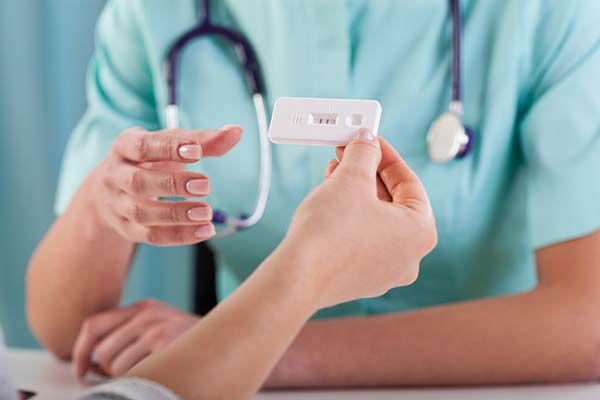Over-the-Counter vs Clinical Pregnancy Testing

Awaiting the results of a pregnancy test can be nerve-wracking, regardless of whether or not you are planning for a baby. Pregnancy testing can provide clarity about what to do next. The good news is that these days, there are many different options available. You can buy a home pregnancy test over the counter or visit a clinic for one. Here is what you should know when trying to choose between the two.
How pregnancy testing works
Pregnancy testing looks for the presence of human chorionic gonadotropin, or hCG. The body only makes hCG when pregnant to stop menstruation and better prepare the womb for the embryo. A pregnant patient should produce enough hCG to be detectable in the urine around day 10 after conception. Levels of hCG will continue to rise until the tail end of the first trimester.
Both home and clinical pregnancy tests rely on there being detectable levels of hCG. It is important not to test too early, as this can deliver a false negative result. Note that a negative test result means the patient is not pregnant; a positive test result means they are pregnant.
How soon can you take a pregnancy test?
While most people think they must wait until they miss their period, pregnancy testing can be effective as soon as 10 days after conception. In other words, 10 days after unprotected sex. However, it is recommended to wait at least three weeks after the date of unprotected sex or as soon as the patient misses their period. This is to prevent a false negative or false positive result.
Remember that it is common to miss one’s period without being pregnant. Many factors could cause a patient’s cycle to be late. Some examples are stress, weight gain or loss, injuries, or even a new workout routine. That said, if one’s period is a few weeks late and pregnancy tests continue to come up negative, it is a good idea to see a medical doctor to ensure there is no underlying health condition or faulty testing mechanism.
Choosing which test is right for you
Home pregnancy tests
Home pregnancy tests are available over the counter at most drugstores, dollar stores, and grocery stores. A major benefit of these tests is that patients can take them in the comfort of their own homes. They are also highly accurate (most are 99% accurate when used correctly). Still, there is a chance for user error. Over-the-counter tests stored incorrectly (such as in a hot car), left in the urine for too long, or expired can give a false negative or positive result.
When to go to a clinic for pregnancy testing
Clinical pregnancy testing requires the patient to visit a medical office and give a urine or blood sample. Urine tests will be similar to home pregnancy testing, while blood tests detect hCG presence in addition to its concentration. Sometimes, the provider will need to perform an ultrasound to confirm a pregnancy.
Our team of professionals has the expertise to provide these tests with minimal to no issues, providing much-needed peace of mind to patients. Further, if pregnancy is confirmed, patients can review their options with the doctor immediately.
Get more information
Whether your period is late or you are trying for a baby and want to know as soon as possible, visit our Pembroke Pines clinic for pregnancy testing. We can handle everything for you, so you do not have to worry about whether you bought the “right” or “most accurate” home pregnancy test. Call {{PHONE}} today to schedule an appointment.
Request an appointment here: https://Southfloridadoctorsgroup.com or call South Florida Doctors Group at (954) 905-2432 for an appointment in our Pembroke Pines office.
Check out what others are saying about our services on Yelp: Pregnancy Testing in Pembroke Pines, FL.
Recent Posts
Curious about what travel immunizations you may need for an upcoming trip? Read on to learn more. Travelers often encounter health problems they would not normally encounter at home. To lessen the likelihood of contracting a life-threatening illness on your trip, research in advance what travel immunizations are required or advised for the area of…
At a family nurse practitioner's office, individuals of all ages and health problems can get access to a comprehensive option of basic health care services. A nurse practitioner has undergone the education required to provide patient care. They are well-equipped to handle most patients' medical requirements. Family nurse practitioners (FNPs), like doctors, can examine patients…
A school physical exam tracks a child's growth and ensures they are healthy enough to succeed in school. These exams evaluate both physical and emotional development, helping parents and providers identify concerns before they affect daily life. Attending these exams each year can help children stay on track as they grow and meet new challenges…
General practitioners, or family doctor, complete professional training to care for patients of varying ages. They are a great resource for various medical services and help patients build trusting relationships with their providers. These are just some of the many reasons to establish care with a family doctor. However, to reap the full benefits of…


